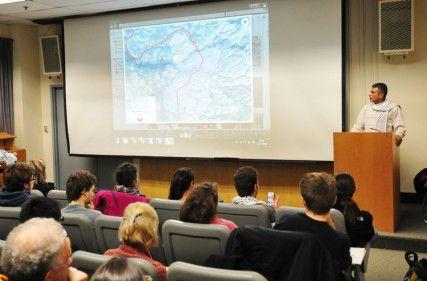Iyad Burnat, a Palestinian leader in the struggle against the Israeli separation wall constructed through his homeland, spoke to students from Boston University, Tufts University and Harvard University Tuesday night to spread his story.

“The important thing is to know about the situation in Palestine,” Burnat said. “What we need from students is to support the Palestinian case and to use what has happened and what is going to help the cause.”
Burnat shared the story of how the wall separated his hometown, Bil’in, and showed clips from a film his brother made about the struggle. He also answered questions from the audience in English and Arabic.
“He is talking about his experience protesting the wall and has some footage of that,” said Zena Ozeir, a College of Arts and Sciences senior and president of Students for Justice in Palestine. “He talks about their adoption of the nonviolent method of resistance to the wall and the different tactics they have taken to protest.”
Burnat said he had difficulties leaving Jordan, but eventually obtained a visa from the U.S.
Once the monarchy of Jordan allowed Burnat to leave, he traveled to the U.S. to speak to university students, beginning in the northeast.
“The wall destroyed everything,” he said. “There were many villages doing the same demonstrations before Bil’in.”
The video showed soldiers removing men and women locked in barrels with their heads and arms exposed to the protests.
Burnat said they put themselves in cages and barrels in front of the Israeli constructed wall in nonviolent protest.
“When there is media, there is propaganda saying these are violent demonstrations because they end violently,” Burnat said. “They send special forces to throw stones at battle stations. So they want to make the people seem violent.”
After talking about methods for protests and how the group makes noise, the movie played stories and experiences during the struggle.
Kristen Martin, a CAS senior and SJP member, said Burnat’s talk was motivational.
“I am walking away with inspiration to continue the struggle,” Martin said. “It gives me a lot of motivation and hope, which we don’t get that a lot in this movement.”
However, Sarah Close, a CAS junior and political programmer of the BU Students for Israel, said the wall has made Israel safer and reduced terrorist violence.
“Not saying the people are terrorists, but the fence has done an incredible job reducing terrorist attacks and movements of terror into Israel,” Close said. “This is not in any way representative of what is occurring in the entire state.”



















































































































Boycott Israel • Nov 14, 2012 at 11:22 am
I wish that someone would ask Israel to be nonviolent.
They have massacred so many thousands of Palestinians and Lebanese people. In fact, last week an Israel supporter at Duke just physically attacked a mock-apartheid-wall exhibit and partially tore it down: http://www.dukechronicle.com/article/table-tipping-disrupts-duke-students-justice-pales —
“…about two hours into the day-long event, senior Zach Epstein, a member of the Jewish Student Union executive board, destroyed part of the wall and flipped over a table of Palestinian food DSJP was giving out to passersby…”
No one is asking for the slightest punishment against him!
As I said, I wish someone would ask Israel (and its supporters) to be nonviolent.